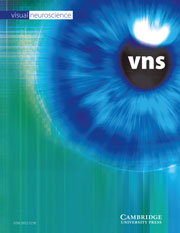Crossref Citations
This article has been cited by the following publications. This list is generated based on data provided by
Crossref.
Yang, Cuibo
Silver, Bethany
Ellis, Steven R.
and
Mower, George D.
2001.
Bidirectional Regulation of Mitochondrial Gene Expression during Developmental Neuroplasticity of Visual Cortex.
Biochemical and Biophysical Research Communications,
Vol. 287,
Issue. 5,
p.
1070.
Mower, George D
and
Kaplan, Irina V
2002.
Immediate early gene expression in the visual cortex of normal and dark reared cats: differences between fos and egr-1.
Molecular Brain Research,
Vol. 105,
Issue. 1-2,
p.
157.
Iwai, Youichi
Fagiolini, Michela
Obata, Kunihiko
and
Hensch, Takao K.
2003.
Rapid Critical Period Induction by Tonic Inhibition in Visual Cortex.
The Journal of Neuroscience,
Vol. 23,
Issue. 17,
p.
6695.
Arckens, Lutgarde
Van der Gucht, Estel
Van den Bergh, Gert
Massie, Ann
Leysen, Inge
Vandenbussche, E.
Eysel, Ulf T.
Huybrechts, Roger
and
Vandesande, Frans
2003.
Differential display implicates cyclophilin A in adult cortical plasticity.
European Journal of Neuroscience,
Vol. 18,
Issue. 1,
p.
61.
MURPHY, KATHRYN M.
DUFFY, KEVIN R.
and
JONES, DAVID G.
2004.
Experience-dependent changes in NMDAR1 expression in the visual
cortex of an animal model for amblyopia.
Visual Neuroscience,
Vol. 21,
Issue. 4,
p.
653.
Feller, Marla B
and
Scanziani, Massimo
2005.
A precritical period for plasticity in visual cortex.
Current Opinion in Neurobiology,
Vol. 15,
Issue. 1,
p.
94.
Siegler, Beth Ann
Ritchey, Maureen
and
Rubin, Jonathan
2005.
Spike-timing dependent plasticity as a mechanism for ocular dominance shift.
Neurocomputing,
Vol. 65-66,
Issue. ,
p.
181.
2006.
Visual Development.
p.
197.
2006.
Visual Development.
p.
169.
Yang, Cui Bo
Zheng, Yu Ting
Kiser, Paul J.
and
Mower, George D.
2006.
Identification of disabled‐1 as a candidate gene for critical period neuroplasticity in cat and mouse visual cortex.
European Journal of Neuroscience,
Vol. 23,
Issue. 10,
p.
2804.
Yang, C.B.
Kiser, P.J.
Zheng, Y.T.
Varoqueaux, F.
and
Mower, G.D.
2007.
Bidirectional regulation of Munc13–3 protein expression by age and dark rearing during the critical period in mouse visual cortex.
Neuroscience,
Vol. 150,
Issue. 3,
p.
603.
Cnops, L.
Hu, T.-T.
Burnat, K.
and
Arckens, L.
2008.
Influence of Binocular Competition on the Expression Profiles of CRMP2, CRMP4, Dyn I, and Syt I in Developing Cat Visual Cortex.
Cerebral Cortex,
Vol. 18,
Issue. 5,
p.
1221.
Alekseenko, S. V.
Toporova, S. N.
and
Shkorbatova, P. Yu.
2008.
Neuronal connections of eye-dominance columns in the cat cerebral cortex after monocular deprivation.
Neuroscience and Behavioral Physiology,
Vol. 38,
Issue. 7,
p.
669.
Arckens, Lutgarde
Van den Bergh, Gert
Cnops, Lieselotte
and
Hu, Tjing-Tjing
2009.
Neuroproteomics.
Vol. 20095549,
Issue. ,
p.
197.
Kiser, Paul J.
Liu, Zijing
Wilt, Steven D.
and
Mower, George D.
2011.
Cellular and laminar expression of Dab-1 during the postnatal critical period in cat visual cortex and the effects of dark rearing.
Brain Research,
Vol. 1383,
Issue. ,
p.
81.
Yang, Cui Bo
Zheng, Yu Ting
Kiser, Paul J
and
Mower, George D
2011.
Identification of α-Chimaerin as a Candidate Gene for Critical Period Neuronal Plasticity in Cat and Mouse Visual Cortex.
BMC Neuroscience,
Vol. 12,
Issue. 1,
Montey, Karen L.
and
Quinlan, Elizabeth M.
2011.
Recovery from chronic monocular deprivation following reactivation of thalamocortical plasticity by dark exposure.
Nature Communications,
Vol. 2,
Issue. 1,
Jacob, Vincent
Petreanu, Leopoldo
Wright, Nick
Svoboda, Karel
and
Fox, Kevin
2012.
Regular Spiking and Intrinsic Bursting Pyramidal Cells Show Orthogonal Forms of Experience-Dependent Plasticity in Layer V of Barrel Cortex.
Neuron,
Vol. 73,
Issue. 2,
p.
391.
Yang, Cui Bo
Kiser, Paul J.
Zheng, Yu Ting
and
Mower, George D.
2013.
Age and Dark Rearing Bidirectionally Regulate the Level and Laminar Pattern of Expression of Abelson Interacting Protein 2 (Abi-2): a Novel Candidate Visual Cortical Plasticity Gene.
Journal of Molecular Neuroscience,
Vol. 51,
Issue. 3,
p.
647.
Kang, Erin
Durand, Severine
LeBlanc, Jocelyn J.
Hensch, Takao K.
Chen, Chinfei
and
Fagiolini, Michela
2013.
Visual Acuity Development and Plasticity in the Absence of Sensory Experience.
The Journal of Neuroscience,
Vol. 33,
Issue. 45,
p.
17789.


